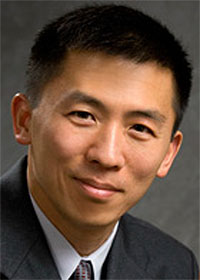Grilling of 9th circuit nominee delayed

Goodwin Liu
The Senate Judiciary Committee was squaring up for a showdown this week over President Obama’s most controversial judicial nominee to date, but that showdown has been indefinitely delayed, while Republicans use a parliamentary delaying tactic on the companion bill to the health care reform law.
The nominee is Goodwin Liu, a professor of law at the University of California Berkeley School of Law. President Obama nominated him last month to a seat on the 9th Circuit U.S. Court of Appeals, which covers California and eight other western states. The American Bar Association gave him a “unanimously well-qualified” rating.
But he also has a paper trail a mile wide and a mountain high. That trail reads like good news for the LGBT community, but it screams “liberal” to Republicans. Fox News has reported that Republicans are “champing at the bit to grill Liu, who has described the Constitution as a living document, advocated for same-sex marriage and suggested health care is a right.”
Fox says Liu’s nomination “is getting extra attention because conservatives are concerned that he could be on the fast track for the Supreme Court.”
Liu is one of four people President Obama has named to federal appeals court positions since February 24. The other three—Ray Lohler Jr. and Robert Chatigny for the 2nd Circuit, and Scott Matheson for the 10th—have relatively quiet credentials.
But Liu has been very much part of the public discourse on a number of civil rights issues, including Proposition 8, the initiative which voters in California passed in November 2008 to ban same-sex marriage.
In one of many essays he has published in various newspapers and publications, Liu told the Los Angeles Times, “there is no question that [Proposition 8] targets a historically vulnerable group and eliminates a very important right.” He has predicted that same-sex marriage will eventually “become an unremarkable thread of our social fabric” and that those opposing it now will eventually be viewed as a “narrow and ultimately temporary majority.”
And he’s characterized U.S. Supreme Court Chief Justice John Roberts as a partisan and divisive figure who is “unfriendly to civil rights.”
He signed onto a friend-of-the court brief, prepared by lesbian law scholar Kathleen Sullivan, in the same-sex marriage lawsuit before the California Supreme Court in 2008. The brief argued that the California constitution’s guarantee of equal protection required same-sex couples have the same access to marriage licenses as straight couples.
Keeping Faith with the Constitution, a book he co-authored with two others, praised the U.S. Supreme Court’s 2003 decision, Lawrence v. Texas, striking down sodomy laws.
“In worrying that criminalization of private homosexual conduct invites public discrimination against homosexual persons,” said Keeping Faith, “the Court understood that the lives and identities of gay people transcend what they do in their bedrooms to encompass who they are in civil society. Protecting gay people’s choices within the intimacy of their homes serves essentially as a safeguard of their dignity in a more public sphere.”
Liu also criticized the nomination of John Roberts Jr. to the Supreme Court, calling it a “seismic event that threatens to deepen the nation’s red-blue divide.” Roberts’ legal career, wrote Liu, “is studded with activities unfriendly to civil rights, abortion rights, and the environment.”
Not surprisingly, Liu’s legal career has been studded with activities friendly to civil rights, abortion rights, and the environment.
Liu clerked for U.S. Supreme Court Justice Ruth Bader Ginsburg during the 2000 to 2001 session and was a member of the Obama-Biden transition team’s Education Policy Working Group. He’s also a board member of the ACLU-Northern California, the National Women’s Law Center, and the American Constitution Society. He graduated from Stanford University, won a Rhodes Scholarship to Oxford, was editor of the Yale Law Journal, and numerous other awards. His wife is a senior fellow at the Center for American Progress, a liberal think tank.
Liu was scheduled to come before the Senate Judiciary Committee on Wednesday. But Republicans employed an obscure tactical maneuver to block almost all Senate committee hearings from taking place—including Liu’s confirmation hearing. Their purpose is purportedly to exert some leverage on the bill of “fixes” to the just signed health care reform bill.
A spokesman for the Judiciary Committee said it’s impossible to predict when the Liu hearing will be able to proceed.


Leave a Reply